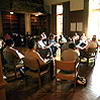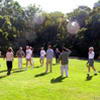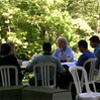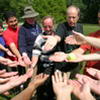30th CONFERENCE ON
PATTERN LANGUAGES OF PROGRAMS
PATTERN LANGUAGES OF PROGRAMS
PLoP 2023 was an epic, in-person experience—to be held at PLoP's originating venue, Allerton Park in Monticello, Illinois. Proceedings Versions are due Feb 15th, 2024

But at the laste,…every thing hath ende…(?)
–Geoffrey Chaucer, Troilus and Criseyde, Book III
The International Conference on Pattern Languages of Programs
Pattern Languages of Programs (PLoP) conference is a premier event for pattern authors and enthusiasts to gather, discuss, and learn more about patterns, design, software development, and the built world in general.
Originally focused on software-related patterns and pattern languages, PLoP has expanded into all aspects of the built world—anything that is designed and made by people, including organizations, culture, and individual practice. Moreover, in addition to patterns and pattern languages, PLoP welcomes papers and essays touching on topics related to the work of Christopher Alexander.
The conference program offers authors a unique opportunity to have their manuscripts reviewed by fellow authors, which occurs mainly in the form of Writers' Workshops [PDF].
Authors and others will find many opportunities to learn more about patterns, pattern writing, and design in the different PLoP activities (Writers' Workshops, Focus Groups, BoF sessions, BootCamp, Games).
The conference provides a friendly and effective environment to give and get feedback, to share expertise, and to help participants improve their manuscripts in order to make them more successful and more publishable.
Call For Submissions

Paper submissions may include short papers by writers wishing to get in-depth pre-conference shepherding by experienced authors and moderated critique during the conference. Welcomed genres include patterns, pattern languages, essays, scientific & technical papers, philosophical papers, and reports; welcomed topics include anything related to programming and software development, organizational structure, design, culture, politics, history, art, and the design and practice of living: anything related to the work of Christopher Alexander.
For this special, 30th PLoP, we encourage submissions related to the histories of PLoP, patterns, and Alexander-style design and practice.
And not just papers: you may submit proposals for free-format discussion groups or workshops bringing together people interested in a hot topic related to any of the above—with a duration about two hours. Non-conventional formats are welcome.
Suggestions or proposals for activities are welcome and encouraged. Please contact the chairs with your ideas. You can find a PDF of the CFP here.
PLoP'23 submissions are peer reviewed and digitally archived at ACM. Papers discussed during a writer's workshop at this conference qualify for submission to the journal "Transactions on Pattern Languages of Programming" (TPLoP) published by Springer. See Springer's pages on TPLoP for details of this journal.

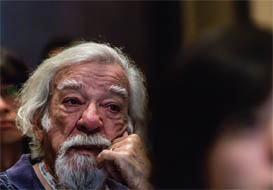
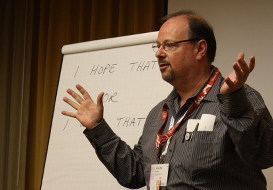
Important Dates
- June 12th: Initial Draft Submission
- June 19th: Shepherding begins
- August 15th: Focus Groups and Lightening Talk Submission
- August 31st: Second Drafts Due for Review
- September 15th: Notification of Acceptance
- Sep 25th: Conference Versions Due
- Oct 22nd: Patterns Bootcamp
- Oct 23-25: PLoP conference days
- Feb 15th, 2024: Proceedings Version Due
More information
For more information, please contact the organizers: Richard Gabriel and Joe Yoder.
At the Hillside Group web site you can learn more about patterns, writing patterns, PLoP conferences, and previous PLoP's.





